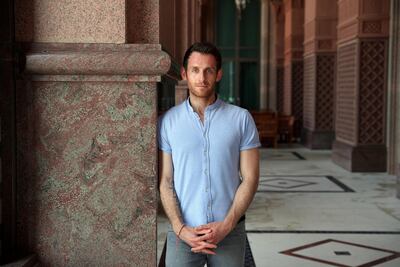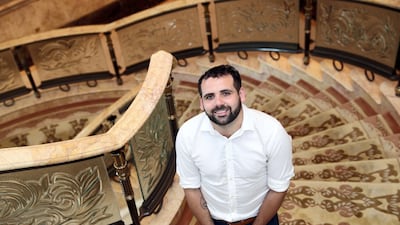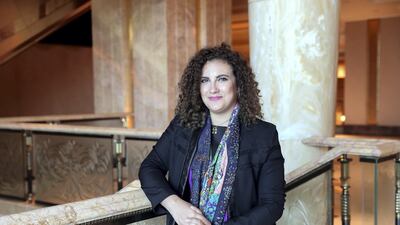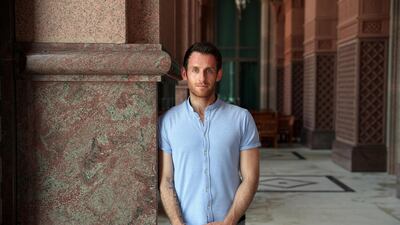It was during 2011 when the worsening civil war in Syria sent a tidal wave of refugees over the border for the relative security of Lebanon.
The sheer numbers threatened to overwhelm Lebanon’s fragile economy and fractured society; no more so than in the country’s public education system, which suddenly found itself facing a tripling of its intake.
At the time, Salyne El Samarany was just completing two years as a kindergarten teacher in a rural school in northern Lebanon. A recent university graduate, she had offered her skills to Teach for Lebanon, then a new organisation aiming to get more educators into under-resourced schools.
“Those 25 students that I worked with in that kindergarten have changed my life totally,” she says.
Today, Ms El Samarany is the CEO of Teach For Lebanon, the same organisation that recruited her as a raw teacher nine years ago, and is now dealing first-hand with the country’s continuing struggle to education what is now estimated to be about 350,000 Syrian refugee children still living there.
Teach For Lebanon is part of a worldwide partnership of 46 member organisations, ranging from Afghanistan and Australia to Sweden and Vietnam. The newest member is Uganda.
The Teach for All movement this month celebrates its 10th anniversary. First developed in the United States and then Britain, each organisation operates independently.
Every member is locally led and funded, often through social entrepreneurs, recruiting what it identifies as future leaders to first spend two years teaching in schools and areas that need them most. Standards are high, and typically only one in four applicants is accepted.

The hope is, afterwards, that they will continue their passion for education, whether still in the classroom, or more broadly in related areas like public policy, raising standards and best practices everywhere, and supported by large and diverse worldwide support group of like-minded people and organisations.
Ms El Samarany was one of those bright prospects, or a Fellow, as those currently teaching are known. After completing their two years of service, they become Alumni, ready to share and help other develop ideas with any of the 46 partners of Teach for All.
After becoming an Alumni, Ms Samarany was chosen as the Lebanese Ambassador for Youth at the Arab Thought Foundation, and in 2014 was one of nine young people chosen for the 2014 UN Special Envoy for Global Education's Youth Courage Award.
The awards were in part recognition for the challenges she faced as a new teacher, in a school where security was sometimes uncertain and resources so stretched that even chalk was in short supply. Only one of the teachers had a university degree.
As CEO of Teach for Lebanon, those challenges have only multiplied. Before the Syrian refugee crisis, only one in four Lebanese children, or about 250,000 students, used the public schools.
Today, the influx of refugee children has swollen those numbers by more than a third. Even so, another 200,000 Syrian youngsters living in Lebanon are still outside the education system.
To date, Teach for Lebanon has placed more than 100 teachers in 19 resource-stretched schools, from Northern and South Lebanon to the Bekaa. The organisation estimates it has helped about 8,400 high-risk pupils.
One of the strengths of being part of international network, Ms El Samarany says, is the depth of support and experience teachers and education workers can draw on, especially when what confronts them on a daily basis can seem so daunting.
__________________________
Read more:
Free online tool helps schools find their business acumen
UAE schools should offer teachers job security and career progession to retain staff
Women of the UAE: A life-long passion for learning
__________________________
“We share best practices, learn from each other and reassure each other that the challenges we face are more or less similar,” she says.
“To see classrooms in Nepal or India where Fellows are doing amazing work gives me hope that this is relevant in our context.”
The Syrian refugee crisis has impacted another young teacher, but this time over 3,300 kilometres away. Simon Horowitz, now 31, had long decided that the career prospects for his degree in business studies did not appeal.
As he puts it: “I was never going to feel comfortable in an office job sitting behind a desk with a computer. I thrive from helping people and get them to start to believe in themselves.”
British born, he moved to Austria in 2010 and became fluent in German. “It’s always been very important in my life where I feel I am working with my heart, where I feel doing something meaningful and in my own little way I am making the world a better place,” he says.

Three years later, he discovered Teach for Austria. "I Just remember going into the office for the first time and feeling the atmosphere there and just sensing the positivity among the Fellows and among the staff", he recalls. "I realised I felt at home there and I wanted to be part of it."
Six weeks of training followed before Mr Horowitz found himself in the only public school in a district of Salzburg with a high intake of immigrant children. “It was a huge mix,” he says. “There was only one Austrian child in the whole school.”
Many of the students were from Turkey and Eastern Europe but as the refugee crisis enveloped Europe two years ago, more and more arrived from Syria and Afghanistan. “At my school we have two full classes of children with this background,” he says.
By then he had the advantage of two years’ experience as a middle school teacher. His confidence in the classroom was a contrast to his early days when: “I felt like I was jumping and I needed someone to catch me. I didn’t really feel like a teacher at that point. I was motivated, and I was ready. I had all of these ideas, and I was kind of stopped in my tracks at the beginning.
“I realised that first of all I have to win the trust of these kids you have to build up a relationship step by step. You have to take it day by day and build up relationships with these children, many of whom have had difficult lives.”
Mr Horowitz has continued to work in the classroom after the end of his two-year initial commitment. He is now part of a worldwide network of over 55,000 Alumni, of whom nearly seven in 10 have stayed working either in education or with disadvantaged communities.
In the Middle East, the Teach for All network operates just in Lebanon and Qatar although it hopes to expand this to five countries by 2020. Three years ago, plans for a Teach For UAE were announced, although the project has yet to launch.
There is certainly much work to be done. One UN report estimates that in the Middle East and North Africa region, more than 12 million children and teenagers do not go to school, including up to half of all girls.
Such problems are not restricted to the Mena region though. Back in 2011, Cristian Cortes realised soon after graduating with degree in molecular biology that life in a lab coat was not for him.
He approached a new organisation, Enseña Chile, or Teach for Chile, and after training, began his two years of teaching in 2012 at a high school. As others elsewhere had found, many of his pupils would come from difficult backgrounds, often as migrants, and where violence and extortion were constant problems.
After his two years were up, Mr Cortes decided he wanted to widen his experience. The Teach for All network, and the opportunities and support it offers, has seen him work in Texas, California, Columbia and Israel. He plans next to visit Lebanon and this week he attended the Qudwa teachers forum in Abu Dhabi.
His interests include helping teachers everywhere to better meet the aspirations of their students. “I realised inequity was not just in the classroom, but across the whole education system", he says. “That there are greater problems.”
Like everyone involved in the Teach for All movement, the story always begins with a slightly nervous young man or women standing at the front of a classroom of expectant young faces for the first time.
“I worked for two years,” says Mr Cortes. “And it has completely changed the way I see the world.”




